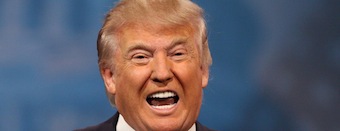Donald Trump. Photo: Gage Skidmore–Flickr.
On March 22, 2019, Special Counsel Robert S. Mueller III submitted his final report regarding potential collusion between the Trump campaign and the Russian government to Attorney General William Barr. Two days later, Barr released a four-page letter summarizing the key findings of the report.
Chief among those findings was this conclusion: “the Special Counsel did not find that the Trump campaign, or anyone associated with it, conspired or coordinated with the Russian government.”
As a citizen, I was relieved to learn that our president and members of his campaign did not conspire with a hostile foreign power to win the presidency. This should come as a great relief to every American, especially since Barr’s letter makes it abundantly clear that the Russian government both (1) engaged in substantial efforts “to influence the 2016 U.S. presidential election” and (2) extended “multiple offers” of assistance directly to the Trump campaign. So, while a hostile foreign power actively sought to conspire with the Trump campaign, the campaign apparently rejected those offers. This is heartening news.
What is considerably less heartening is the president’s response to this news. Shortly after Attorney General Barr released his summary letter, President Trump tweeted, “No Collusion, No Obstruction, Complete and Total EXONERATION. KEEP AMERICA GREAT!” This is a deeply troubling response and one that should give every American pause. What is the public to make of the president’s claim, on the one hand, that the Mueller report offers “complete and total exoneration” of collusion with Russian and his consistent claim for nearly two years, on the other hand, that the Mueller investigation is a “witch hunt,” “hoax,” and “illegal”? These two positions are utterly unreconcilable.
If the Mueller investigation was, as president Trump claimed on Twitter 182 times, a “witch hunt,” then, by definition, it is illegitimate and cannot exonerate him.
The president simply cannot have it both ways. He cannot reasonably claim that the investigation is illegitimate and that its findings are legitimate. Only one of these things can be true. I am going to work from the assumption, which is in President Trump’s best interest, that the Mueller investigation was legitimate and, therefore, he and his campaign did not conspire with the Russian government to subvert a free and fair election.
If the investigation was legitimate, which the president apparently now accepts, that means he intentionally lied to and misled the America public about its legitimacy no less than 182 times (on Twitter alone). Why? There is a simple and obvious answer to this question. The president repeatedly sought to discredit the Mueller investigation not because his campaign conspired with Russia (we now know that it did not), but because the Mueller investigation confirmed (what our intelligence community already knew and had briefed him on) that Russia meddled in the 2016 US presidential election to his benefit.
Trump sought to discredit the Mueller investigation for one reason and one reason only: he was concerned that public awareness of the full extent of Russian interference in the election might make his victory appear illegitimate.
Indeed, Trump’s efforts to obscure the assistance (albeit “no collusion”) he received from Russia during the campaign explains everything that followed. First, and this is not widely known, it explains why Trump created the expression “fake news.” Trump invented the very idea of “fake news” AFTER he was elected president. His early uses of the phrase on Twitter were primarily designed to critique news media accounts of Russian interference in the 2016 US presidential election. On January 10 and 11, 2017, Trump tweeted the phrase “fake news” three times regarding reports of Russian interference in the election.
Second, it explains why so many high-level Trump administration officials tried to hide their contacts with Russian officials before and after the election, going so far as to perjure themselves in front of the US Congress. Third, it explains why Trump has repeatedly attacked his own Justice Department and intelligence agencies and sought to undermine their credibility. Fourth, it explains why Trump formed a commission designed to prove that he only lost the popular vote because of illegal voting. Fifth, it explains why Trump was and is so desperate to convince his political base that Vladimir Putin is a fine person and Russia is not an adversary.
Donald Trump, a man whose entire political career was built on attacking the legitimacy of our previous president, now risks being viewed as illegitimate because he received considerable, if uncoordinated, assistance from the Russian government.
BRIAN L. OTT, a professor of communication studies and director of the TTU Press at Texas Tech University, is co-author, with Greg Dickinson, of “The Twitter Presidency: Donald J. Trump and the Politics of White Rage.”

